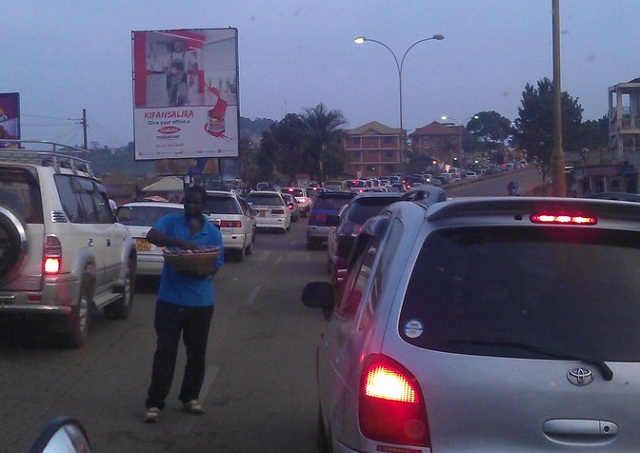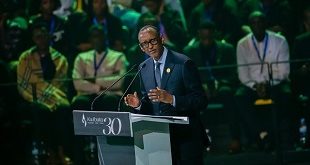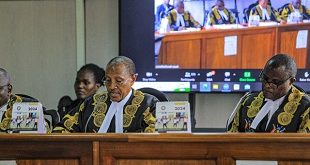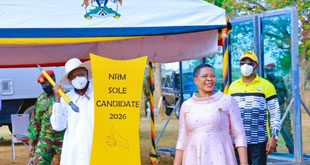The triumph of security over politics in Museveni’s quest to contain Besigye’s defiance
From Saturday, May 28 to June 03, Uganda has been a host of two visiting dignitaries – Presidents Park Geun-hye of South Korea and Recep Tayyip Erdogan of Turkey. For most of the entire week, the road to Entebbe International Airport has been literally closed to over 254,000 people who use it daily. Motorists were forced to use bad dirty roads. Consequently, tens of thousands of motorists were stuck in traffic or mud in these narrow roads causing airlines to fly back almost empty.
On Saturday, I was flying out of the Entebbe Airport and met hundreds of angry travelers – tourists, business executives, Ugandans, conference attendees etc who had missed their flights after spending five hours (yes, I mean five hours) trying to navigate their way through diversions to Entebbe. Apparently, the road would be constantly closed to ensure security of the visiting dignitaries.

It does not make sense to close the only road to the airport, which is used by hundreds of thousands of people daily because of a visiting president. The cheaper alternative would have been to fly the dignitary using a helicopter from Entebbe to Kampala and back without causing a traffic nightmare. If our country does not have the helicopters to fly such important guests, we would have rented some from Rwanda, Kenya or South Africa. This would have been a cheaper alternative (both economically and politically) than shutting down a highway – not just for a day but a week.
Why does government resort to such insensitive and self-defeating strategies? The NRM has increasingly come to behave as a government under siege precisely because it is under siege. It has lost most of its ideological traction especially among people aged 15-35 years who are urban and educated (or semi-educated). Over the last ten years, there has been a massive shift in perceptions in this segment of our society. The less intelligent (and therefore more emotional) in this demographic segment have become radicalised. They support Opposition leader Kizza Besigye in whose defiance they find meaning and see hope.
The hotbed for this radicalisation is Kampala, which is not just our capital but also our country’s center of gravity. By “center of gravity” I mean the heart and nerve center of Uganda around which our political and economic life depends. If you paralyse Kampala politically, your also cripple it economically. Thus, even if President Yoweri Museveni enjoyed the support of 70% of the rural folk (which constitutes 79% of our population and which I think he actually enjoys), his control of power can be gravely endangered if Besigye-mania in Kampala was not well managed.
Since the days of ‘Walk to Work’ demonstrations in 2011, Besigye has emerged as a real threat to power by his militant style. His appeal among the city’s impoverished and disenfranchised has grown by leaps and bounds. Social media has created a platform through which anger against the government is being nursed and radicalised. It has also given Besigye’s supporters previously unavailable opportunities to argue their case and rally his base. Increasingly therefore, Kampala is a tinderbox of extreme anti-Museveni sentiment.
Museveni has sought to contain urban militancy and youth insurgence that are propelling Besigye’s brand using two main approaches. The first has been a violent crackdown on protesters using police and military hardware. It is the visible approach journalists see and report on. But this has only been a tactical measure to achieve a short-term objective of regime stability. In the medium term, however, the NRM through the State has employed a strategy of co-optation of youth leaders in Kampala largely through material incentives (read bribery). Although this has cut the head from the body, leaving the latter unable to act effectively, it has not tamed the growth of militancy and insurgency.
The success of these two measures in the short to medium term has led some in the government to what I consider a fatal error – the belief that repression and bribery are sufficient to ensure regime stability in the long term. Power rotates around three pillars: military/police might (the power to coerce), economic and financial muscle (the capacity to bribe) and soft power (the ability to cajole, persuade and convince). With the exception of Museveni’s son in law Odrek Rwabwogo, it seems government has lost sight of the aspect of soft power. This is in spite of a long history of NRM appreciating the value of siasa (or ideology) in power dynamics.
Why does NRM ignore siasa (or soft power) in its strategies of containing Besigye? Maybe it has internalised the criticism of its opponents and thereby come to believe that they have totally failed. I have tested this hypothesis. My exceptionally intelligent research assistant, Ian Ortega, keeps digging for me figures on different social indicators on Africa. Uganda always comes among the top five performing countries on the rate and speed of improvement. My indefatigable Personal Assistant, Simon Nyesiga, compiles for me figures on economic data comparing Uganda to other African countries and Uganda comes among the top five performers.
We have gone beyond Africa and rated Uganda’s performance against the advanced countries in Western Europe and North America on the growth of selected indicators (GDP, exports, revenues, etc.) and Uganda under Museveni beats them all.
The argument that Uganda performs this well is not because it is coming from a low base. How come in Africa only Ethiopia and Rwanda do better? These research findings have led me to develop what I call “Uganda’s (or Museveni’s) incompetence paradox.”
While I have always seen our government as incompetent, research findings show that it performs very well comparatively. This has increasingly led me away from my initial biases based on simple anecdotes like Abim Hospital and Paya Primary School. On the aggregate, Museveni’s government actually delivers public goods and services far better than most countries within its comparison group.
Why then doesn’t NRM seek to win Ugandans on the basis of these achievements? This can be done through political mobilisation and media engagement especially on social media. Yet, NRM has increasingly come to rely heavily on violence and bribery. Kampala looks like a war-zone with APCs on almost every roundabout in the city. Maybe it is because Museveni is a specialist in violence, an instrument he used to capture power and therefore reverts to it to protect it. If this is the case, then indeed, old habits die hard.
amwenda@independent.co.ug
 The Independent Uganda: You get the Truth we Pay the Price
The Independent Uganda: You get the Truth we Pay the Price



The above article is tilted in a direction that potrays government excesses as justifiable though out of line with what is right.The article at the same time demonizes the opposition as”extrimist” thus requiring containment,which is an abserd position.
CASE I
My mother has been in her trade for over 40yrs now. She is a professional house wife. And my father has been her only employer in as much those years. But just like most relationships, she has had a steady relationship on the sidelines as well (you can call it her
“side-dish.”) Yes, my mother has had a soft spot for this particular specie- she rears chicken.
CASE II
A month ago, Mwenda penned an article about the collapsed cancer machine at Mulago. To Mwenda it didn’t make much sense as to why there was hullabaloo about the collapse of a machine that only served a small section of the society (cancer is for the elite.) He pens another article today, adding his voice to the more than 250,000 Ugandans who were blocked from plying the Entebbe – Kampala highway. And his question is, ‘why does government resort to such insensitive and self-defeating strategies? (Little could he have bothered, that 250,0000 was a comparatively small fraction of the more than 35,000,000
Ugandans and that 25 miles of Entebbe road were a whisker of the tens of thousand miles that make up Uganda’s road network.) What is worth noting is that on that same day, Mwenda was flying out of Entebbe airport. Selfish.
CASE III
Lynch (2002:841) sees the quasi states as failing: ‘They have the institutional fixtures of statehood, but they are not able to provide for its substance.’ Fairbanks (2002: 141) shares this view and expresses the failure of quasi-states in ever stronger terms as ‘the weakest of the weak’. A working definition of strong states is provided by Nodia (2002: 415) as ‘states
that are capable of carrying out functions that they themselves claim and that they are reasonably expected by their populations to carry out’. Building on Nodia’s definition, Young (2002: 446) defines the opposite phenomenon of a ‘weak state’ as a state that ‘meets
minimum Weberian definitions of institutions of rule and is able to carry out some basic functions but is far from performing according to domestic and international expectations of a “normal” state’. There is a difference between state building and nation building. The modal tendency of quasi-states is deficient nation-building. Quasi governments ‘maintain the daily operations of legislative, executive and judicial institutions, but performs very few services for their populations. Pascali (2001), notes that such states do not have rule of law, no ethnic tolerance, no human rights. Not even an economy, except foreign aid and organized crime.
INTERLINKING CASE I, CASE II & CASE III (RESOLUTION)
My mother’s “side-dish” (the rearing of chicken) was a gesture of implicit power
(soft power). Scholars state that power need not consist of any observable link
between the people involved. They make a distinction between manifest power and implicit power. Implicit power is where members are so attuned to one another, for instance, in a family there is often no observable communication yet members can manage to “read” and
comply with one another’s wishes. In the African tradition, my father was duty-bound to provide for my mother. However, it did not have to be my father’s command for her to comply with what my father would have wished for but out of fondness they had for each other. What Mwenda is gibbering away with, is termed as a ‘client state.’ A client state is a state that is economically, politically, or militarily subordinate to another more powerful state. Clearly, by all indicators, Uganda is a client state for both South Korea and Turkey. The Gross Domestic Product per capita of South Korea is at 25,000 US dollars. That of Turkey is at 9,000 US dollars. And Uganda at 700 US dollars. Virtually all client-states have a large shadow economy, often with intimate links to top state leaders. Local officials and authorities
profit from this business through cuts and kickbacks, but the state as such, derives no benefit from it. The resulting lack of transparency in these states is extremely attractive for crime and other shady businesses. The “patron – client” relationship maintains that the former does not seem to be injured. It was therefore, expected although not deserving, for the Ugandan state to inconvenience 250,000 Ugandans (keeping other factors constant) at the expense of just two individuals. But as de Waal(2003: 246) has argued. Normally, successful nation-building to a large degree depends upon successful state building. Through nation-building, the state authorities are, as it were, asking the population to attach their allegiance to this particular state by identifying with it. Before the citizens decide to do so, they are prone to ask, ‘What do I get in return?’ As the state works towards fulfilling people’s interests and wishes so do they nod towards its authority. As for my mother’s case, my father’s love was radiant enough to effect such results.
I stopped reading the Independent years ago, occasionally Mwenda posts on Facebook not so much because its a trend in modern business but more so to drive traffic to his partially defunct briefcase publication.
Ugandans fall into his trap as opposed to ignoring him thus keeping close to relevant which he ceased to be years ago. Today I was one such Ugandan. Although the topic was decent (Stupid Closure of Entebbe Road) My gut feeling told me it would end up with him praising his paymasters Rwanda/Kagame and NRM/Museveni. I read with suspicion and almost thought my suspicions were this time misplaced and there it was.
This idiot is so predictable its just like seeing a pig eat knowing its a matter of minutes before it shits. Like the person below noted, this fool is so selfish and insensitive to Cancer stricken Ugandans to say he doesn’t see why the whole country is concerned about the plight of Cancer patients because they are a minute fraction of the population but has the guts to write this article because he was personally inconvenienced. Such are Uganda’s so called elite even these so called Boda Boda folks reason better than them.
Apparently one has to be “extremely
intelligent” or indefatigable, like Mwenda’s research and personal assistants
(Nyesiga should feel insulted), to realize that Uganda is doing extremely well
and NRM is delivering public goods and services at A+ level, never mind that
less than 1/3 of P7 pupil can write beyond their own names or pass a P2 numeracy test.
But the winner is “The less
intelligent (and therefore more emotional) in this demographic segment …
support Opposition leader Kizza Besigye”. I would love to see the figures that
support this conclusion, Ortega and Nyesiga step forward, please.